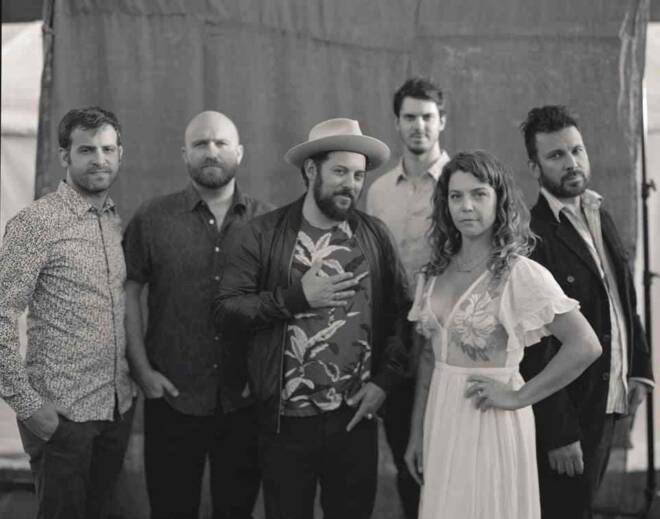


 Mt. Joy - Death
Mt. Joy - Death
On a charity livestream, Mt. Joy frontman Matt Quinn explained that “Death” is a misnomer—it is a life-affirming song, he assured, about lending a hand to help others work through problems rather than run away from them. “I know why you like death,” he sings, “‘Cause when you get in trouble, pulled under rubble / You want something else,” but he is there to pull you out of the rubble. Quinn says of the song, “I was hoping this song would remind people and myself that there are so many family members / friends here on earth that want to help us find our peace, and there really is so much beauty here, especially when you let people help you.” The song’s meandering verse gives way to a raucous chorus best sung en masse, shoulder to shoulder, shouting with little to no regard for tonality, joining on the “Ooh la la” even if you don’t know the words. “Death” is a reminder of all of the beautiful moments in life and succeeds in creating one all by itself.
— Daniel Shanker on May 19, 2020
Waxahatchee - Fire
The opening notes of Waxahatchee’s “Fire” are purposefully gentle, evoking the disquieting silence after hanging up a telephone. Waxahatchee’s upcoming album Saint Cloud, due out March 27, was written in the wake of singer Katie Crutchfield’s commitment to sobriety, and what comes after the dial tone are the wobbly first steps of someone with a newfound resolve. “It’s about the internal dialogue of shame surrounding mistakes you’ve made in the past and how we spiral and beat ourselves up when we slip,” says Crutchfield. The repetitive chord structure—the same three chords over and over—is a reminder that, for better or for worse, life goes on. Falling into familiar patterns can feel like an unstoppable downward spiral, but Crutchfield instead chooses to use the spiral as a foundation for new patterns, using repeating guitar parts interleaving with one another as building blocks. “If I could love you unconditionally / I could iron out the edges of the darkest sky,” she sings to herself. And while her voice betrays that she may not be there yet, she’s laying the groundwork.
— Daniel Shanker on March 3, 2020


 Dustbowl Revival - Dreaming
Dustbowl Revival - Dreaming
"Dreaming," the first track off of Dustbowl Revival's most recent album Is It You, Is It Me, is reminiscent of their typical summery style: jammy, light and fun-loving. The band's combined vocalization is similar to Edward Sharp and the Magnetic Zeroes and many other folk-pop, alternative acts of the early 2010s that generated prolific indie music. "Dreaming" feels warmer than one would expect from an album released this time of year. That being said, Dustbowl Revival tend to emanate a decadent summery feeling that many bands in their genre don't share. Perhaps best preserved for a sunnier day and vibe, listen to "Dreaming" on your drive home from work.
— Hannah Lupas on March 3, 2020
Phoebe Bridgers - Garden Song
Last week, Phoebe Bridgers returned with “Garden Song,” though it feels like she never really left. Since Stranger in the Alps, there’s been no lack of output from her, joining forces with Julien Baker and Lucy Dacus as boygenius, and Connor Oberst as Better Oblivion Community Center. That said, there’s a special kind of sublime sentimentality in Bridgers’ solo work that has made her sophomore album all the more anticipated. On “Garden Song,” Bridgers conjures the surrealist daydream that is young adulthood in a wash of aching lyricism and the kind of drowsy production that made Stranger a swift knife to the heart. Now a beloved patron saint of sadness, Bridgers, ever conscious of the pains of existence, seems that...she just might be happy? May we all aspire to be able to say “I have everything I wanted.“ Be sure to watch the video, it is quite literally a trip.
— Emma Bowers on March 2, 2020
Tyson Motsenbocker - Come to California
Soft, melodic and gentle, Tyson Motsenbocker's "Come to California" is a singer-songwriter emoting his most earnest plea. The songwriting itself seems to be as gritty as its production: an honest reflection of an honest feeling. Though the music and writing style is simple and stripped-down, Motsenbocker's talent is undeniable. The bare-bones nature of the music paired with his unusual and transfixing vocal has a really pleasant and iconic effect. The lyrics move from punchy and curt, "Is it such a bad idea being brave, wearing our skin down to the fray?" to softer and more metaphorical, "when the pine trees turn to palms.... you're the one change I wanted all along." This is certainly a good track to keep in your back pocket for when the weather gets a little warmer. Listen to Tyson Motsenbocker's "Come to California" and his recently released LP, Someday I'll Make It All up to to You anywhere you stream.
— Hannah Lupas on March 2, 2020


 Kid Mountain - Hangman
Kid Mountain - Hangman
From the opening strands of Kid Mountain’s new single "Hangman," it’s apparent the band isn’t leaving listeners ‘hanging’ when it comes to their influences on the first single to their upcoming record, The Birds Are In Misery. If the album’s title, and the visible nod to veteran kings of misery, Modest Mouse, are anything to go by, Kid Mountain is gearing up to tell a few stories or two about subjects more on the sadder side, a stark contrast to the title of their record released in 2012, Happies. The band seems like they're ready to tackle the incredible confusion that can result from miscommunication; the song kicks off with a grunt, perhaps showing off obvious frustration. Kid Mountain takes us through what could be perceived as a stream of consciousness, starting with some thoughts about coupons, before slowly drifting into a more serious conversation with the lyrics, "If you're the sun strong and brave / then I am a person trapped in this cage." Keeping with the band's Soundcloud description where they detail their desire to "Make eclectic music that bridges the gap between mindless dance tunes and thoughtful societal conversation," "Hangman" maintains the anxiety-inducing feeling of an old school game of hangman: you never know which direction you'll be taken. The official video for "Hangman" was released on February 25 via BIRP.
— Taylor Hodgkins on March 2, 2020
Claud and Del Water Gap - My Body
Brooklyn-based songwriters Claud and Del Water Gap (Holden Jaffe) do autotune with a DIY twist in their single “My Body.” Swinging between achingly poignant and tongue and cheek, their auto-tuned croons layer perfectly as they sing, “I already know / I figured it out / I think I figured you out / you only want me for my body,” which feels like both a joke and a statement at the same time. They mix sounds in a playful way with spurts of electric guitar breaking through the droning synths. It never stays in one mood for long—jumping from one sound to the next with ease. In the bridge, Claud sings, “Tell me to wait for this / already late so I leave my door open / for when you get lonesome” without autotune—winking at the possibility of a deeper meaning. The track marks the second collaboration from the two following their cowrite of Claud's "Never Meant to Call."
— Corey Bates on February 28, 2020
Genevieve Stokes - Surface Tension
Genevieve Stokes sounds wise beyond her 18 years in her newest single “Surface Tension.” The Portland, Maine-based singer/songwriter sheds light on the cyclical torture that permeates adolescence, “I’m treading muddy waters / I’m not what you wanted / I’ve been through this before.” Stokes doesn't wallow in self-pity though. She states it more as a fact than something to mourn, breaking from the cycle with poignant lyricism—refusing to fall victim to teenage melodramatics. Her vocals are clear and smooth with a slight warble when she slips in and out of her upper register. The real sweet spot is when she settles into an almost gravely tenor before sweeping back up gently. “Surface Tension” is the newest single from Stokes’s debut EP out in summer 2020.
— Corey Bates on February 28, 2020
Adam Melchor - 30 Minutes
Adam Melchor puts his guitar to the side for his newest single “30 Minutes.” Instead, he opts for a gentle piano-centric offering that lives somewhere between melancholy and hope. Melchor’s voice climbs and falls with the turn of each phrase as he tells a story through short insights into a relationship, just enough to create a world where the listener can fill in the blanks, “every time you eat alone you say that you think of me / cause I used to say that’s what I like.” He turns what could be a sad song into something with at least a seed of hope—singing, “I just need a person who will hear just how I’m hurting / when something not so pleasant hits the fan.” “30 Minutes” is off of Adam Melchor’s newest EP Summer Camp out February 28.
— Corey Bates on February 28, 2020
Your Smith - Man of Weakness (Acoustic)
Stripped back and sweet, “Man of Weakness (Acoustic)” is a gorgeous and raw rendition of the original. First released with a full arrangement as part of Your Smith’s 2019 EP Wild Wild Woman, this track carries its own with nothing but guitar, soft keys, lovely vocal harmonies, and raw emotion. Like a cool breeze on a warm summer day, the arrangement is light and pleasing, and this is due in large part to Caroline Smith’s clear, dynamic vocal, which is vaguely reminiscent of Sheryl Crow, and acts as the song’s most powerful instrument. In the lyrics, Smith paints an evocative picture of endings and all the emotional baggage one has to carry as a result: “I can't believe this, I can't deny it, I thought I'd beat this / And now I'm laughing 'cause I was acting / Like I ever stood a chance to win this time.” Through the relatable lyrics and a brighter melody, Smith reminds us that heartbreak is temporary, but good music will always be there. Introspective and soft, “Man of Weakness (Acoustic)” is a hopeful tune for gentler days.
— Britnee Meiser on February 27, 2020
Modern Diet - Post Grad
New York-based Modern Diet’s new track “Post Grad” astutely captures the disillusionment of growing older. Its subject feels detached from the passage of time, comparing himself to Sisyphus, a Greek mythical figure doomed to push a boulder up a hill for eternity. However, the song itself refuses to remain stagnant; while it begins melodic and airy, its lightheartedness is eventually disrupted by a biting guitar riff that incites the start of the track's decomposition. From this point, the energy builds steadily, at times returning to its initial softness only to reject it again, until it approaches a cheerful and choral end that feels like a final liberation. However, the listener soon finds that the narrative of “Post Grad” is circular, and that despite the battling sounds that seemed to have met their end, its narrator has not actually broken free. Rather, his farewell suggests that he has resolved to push his boulder into oblivion: “I have to go have to go, I have a boulder to push.”
— Brittany Cortez on February 27, 2020










